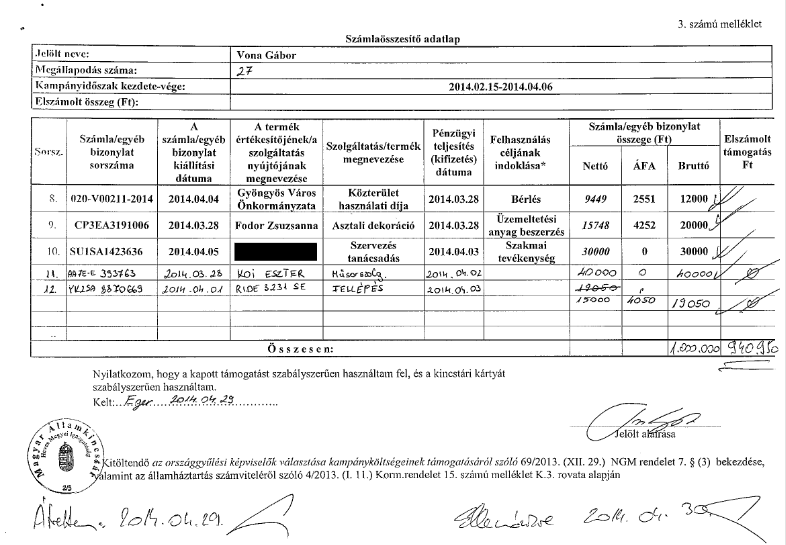The https://english.atlatszo.hu use cookies to track and profile customers such as action tags and pixel tracking on our website to assist our marketing. On our website we use technical, analytical, marketing and preference cookies. These are necessary for our site to work properly and to give us inforamation about how our site is used. See Cookies Policy
Atlatszo.hu wins case to release politicians’ campaign election finances
After several attempts, Atlatszo.hu has succeeded in their demands that Hungarian politicians who were part of last year’s general election campaign, declare in detail how they spent their official allowances. Going through the vast amount of data is work in progress, but what we have uncovered so far already shows plenty of curious cases.
Last year’s general elections gave all contenders running for individual mandates a HUF 1 million (€3,200) allowance to spend on their campaigning. All the candidates had to do was to reach a certain low percentage of support at the actual voting and provide an expense account to the state treasury MAK and that was it. However, the state institution didn’t make these records public.

The entire process was rife with scandal, new election rules took effect for the first time in 2014 which rearranged political finances and it attracted a wide range of bogus political parties that picked up state support and then disappeared, while the major political players’ spending was almost equally curious if not suspicious.
As such, we filed a formal request to MAK to make the expense records fully public, which was mostly denied. The treasury provided lists of the recipients, but didn’t release the full details of the transactions, arguing that the candidates have an obligation to make statement about how much money they spent and besides, only MAK and the State Audit Office have jurisdiction to view the records in details.
In response to these arguments we decided to sue. We argued that our overview of the receipts will not in any way hinder the authorities’ work, not to mention the fact that oversight of how public funds are spent must not be monopolized. We also pointed to the statements MAK referenced, which only showed lump sums without any information about the nature and the seller of the goods and services that were used.
Through the various instances of the legal procedure the court sided with Atlatszo.hu in almost all aspects and ordered the release of the receipts as well as the identities of the companies that served as vendors. Our only demand which was rejected was to reveal the identities of the private individuals that contributed to the campaign. The court said those people had the right to their privacy and required that their private information be redacted in the documents. We maintained that the use of public funds warranted also releasing this information.
Now that we have it, we are also making the database accessible to the public.
Our first review already shows a number of very curious cases, for example where a candidate spent the allowance in a single transfer, or submitted overly simplified records, noting that the amount was spent on “advertisements” without any further details. We also found an instance when a candidate wanted to cover the costs of a belly dancer’s performance from state funds, an attempt that MAK fortunately prevented.
When we first received the records, we organized a collective marathon session to start processing the documents, in cooperation with fellow NGOs Transparency International, K-Monitor (public funds watchdog) and TASZ (civil liberties advocate). At the event, 51 participants, most of them volunteers, went through 847 pages, exploring the spending patterns. It was a difficult task, and many of the records were copies of poor quality or barely legible handwritten slips.
We are encouraging everyone to actively start browsing the records for their respective constituencies and we are also inviting volunteers to help us process and digitalize the huge amount of data. Those interested should fill out this form.
Share:
Your support matters. Your donation helps us to uncover the truth.
- PayPal
- Bank transfer
- Patreon
- Benevity
Support our work with a PayPal donation to the Átlátszónet Foundation! Thank you.
Support our work by bank transfer to the account of the Átlátszónet Foundation. Please add in the comments: “Donation”
Beneficiary: Átlátszónet Alapítvány, bank name and address: Raiffeisen Bank, H-1054 Budapest, Akadémia utca 6.
EUR: IBAN HU36 1201 1265 0142 5189 0040 0002
USD: IBAN HU36 1201 1265 0142 5189 0050 0009
HUF: IBAN HU78 1201 1265 0142 5189 0030 0005
SWIFT: UBRTHUHB
Be a follower on Patreon
Support us on Benevity!

